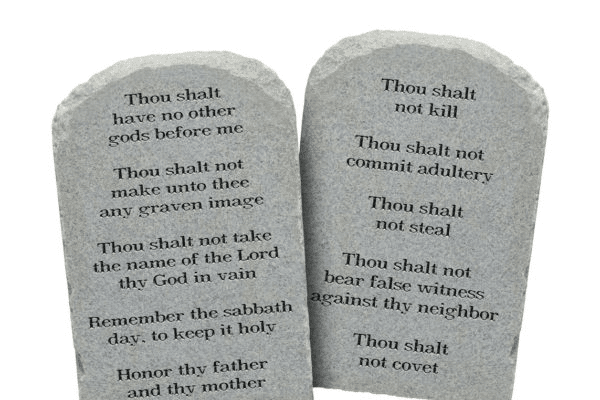
Posting the Ten Commandments in Louisiana Public Schools
This past week the Louisiana Legislature passed into law a bill that requires the displaying of the 10 Commandments in every public- school classroom in the state. Our young people are trying to survive the cultural cesspool that modern American society has become and being reminded of the eternal principles of morality and faith, and encouraging respect for parents, can only benefit them.
Naturally, the atheist and “civil liberties” groups like the ACLU (which hasn’t found a conservative civil liberty to champion in decades) immediately vowed to sue arguing the display constitutes an “establishment” of religion, notwithstanding the fact that the 10 Commandments also provide the general foundation for American civil and criminal law.
These groups quote Thomas Jefferson, that there should remain “a separation between church and state.” Well, all that our Framers intended by the Establishment Clause was that there be no official state religion of the kind the Pilgrims fled when they settled in America. That is all. The Framers never intended for there to exist this outright hostility to all notions of religion and faith in public life. However, that’s what we have.
Jefferson absolutely favored free exercise of religion and cited as one of his proudest accomplishments the religious freedom law he wrote for his native state of Virginia. Jefferson opposed a mandated state religion. Beyond that, he supported the broadest definition of religious liberty possible.
Back to the new law.
It should be unnecessary but perhaps the way to avoid having the law struck down is by including other historical displays such as the Declaration of Independence, the Mayflower Compact, and the Northwest Ordinance. Perhaps, the Jewish Torah and Muslim Koran as well. By surrounding the 10 Commandments display with other religious and historical displays, it would be imbued with academic, educational, and historical value outside of any religious context.
The current U.S. Supreme Court has been more accommodating of free exercise of religion, including the case of Kennedy v. Bremerton, the “praying football coach” who was fired from his job at a public high school after he briefly knelt after games to offer a prayer of thanks. The Court ruled in his favor, finding that the coach had never attempted to force his players to join him, or based playing time upon player participation in the prayer. Rather, in firing the coach the school district had unconstitutionally punished him “for engaging in a brief, quiet, personal religious observance.”
I note that for decades the Supreme Court employed the “Lemon test” in establishment of religion cases. (Lemon v. Kurtzman). The test applies three principles: 1) Whether the “religious” action or display had a clear secular purpose. 2). Whether the primary effect of the action or display would advance or inhibit religion. 3). Whether the action or display would create an excessive government entanglement with religion.
Let’s do a quick analysis:
I would argue the display has a clear secular purpose in that the 10 Commandments have great historical, academic, and educational (and, depending upon how the display is prepared and posted, even artistic) significance aside from any religious connotation. Second, I don’t think a display of the 10 Commandments in Louisiana public schools has the primary effect of advancing religion. I think it primarily contributes to students’ education about American and world history as well as the study of the Bible as an academic pursuit. Finally, it would not create an excessive entanglement with government because a display of this type would simply be present to be noticed or not noticed by uninterested students. It’s no more an entanglement of government with religion than a rendition of the Mona Lisa hanging on the same school wall.
Well, the Lemon test is complicated and confusing and has now been rejected by the Supreme Court which ruled that, instead, the establishment clause “must be interpreted by ‘reference to historical practices and understandings.” I much prefer the new standard because America has many historical practices involving faith and religion in the public square as well as the understanding that such practices are based not only on faith and religion but on our nation’s culture, history, and tradition.
Even if this new law is struck down, it nonetheless has great symbolic value in having existed in the first place. Essentially, the new law—however long it may last—sends an unmistakable message about the values of Louisiana and what we think is important to emphasize in public education.


